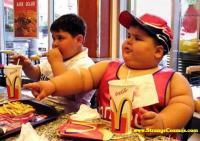McDonald’s violent ‘Happy Meal’ toy promotion the latest target of parents, health advocates
 Creative Commons photo by robadOb
Creative Commons photo by robadOb
Will Congress restore the Federal Trade Commission’s authority to limit unfair advertising to children and put a ban on junk food advertising? Since 1980, marketing directed at children has increased exponentially and free of government oversight.
McDonald's Happy Meal promotions are under attack. It’s not just the negative impact fast foods are known to have on child obesity, say public health advocates. It’s also the major food marketers’ unconstrained advertising tactics aimed at children and their promotion of unhealthy stereotypes.
McDonald’s latest marketing campaign features ‘The Thing,’ a bulky orange Marvel comic action figure, who roars, “It’s clobbering’ time!” when the button on its back is pushed. The toy is inappropriately aimed at preschool boys, says the Campaign for a Commercial-Free Childhood (CCFC). The organization has launched a letter writing campaign telling McDonald’s to remove the toy, and its colleague ‘The Human Torch’ from Happy Meals.
"It's bad enough to use junk toys to sell children on junk food," said CCFC's Director Susan Linn. "But now, for preschool boys, a so-called happy meal at McDonald's features the horrifying spectacle of a man engulfed in flames and a menacing figure that explicitly spurs them to violence."
Other public health organizations believe McDonald’s and other fast food chains have gone too far in efforts to promote fast food to children using integrated marketing campaigns.
Earlier this summer, the Center for Science in the Public Interest (CSPI) served McDonald's with a notice of its intent to sue if the company continues to use toys to market Happy Meals.
Professional organizations have been calling for regulation of advertising targeting children for many decades -- with little result. In 2004, an American Psychological Association task force called advertising specifically targeted to young children “unfair” because children cannot differentiate between advertising and fact. “We believe that the accumulation of evidence on this topic is now compelling enough to warrant regulatory action by the government to protect the interests of children, and therefore offer a recommendation that restrictions be placed on advertising to children too young to recognize advertising’s persuasive intent.”
Children under age eight are cognitively and psychologically defenseless against advertising, according to a report by the American Academy of Pediatrics published in Pediatrics journal in 2006. “They do not understand the notion of intent to sell and frequently accept advertising claims at face value.”
The Federal Trade Commission has publicly frowned upon “unfair” advertising to children for decades. But public advocacy groups such as Center for Science in the Public Interest and Campaign for a Commercial-Free Childhood may, in time, be more effective in changing policies regarding advertising to children than regulatory agencies. That’s because Congress removed the FTC’s authority regarding “fairness” in commerce.
In 2008, after researching the amount of money spent on food and beverage marketing to children and adolescents, the FTC called on the self-regulated food companies “to adopt and adhere to meaningful, nutrition-based standards for marketing their products to children under 12.” The FTC found that 44 food and beverage companies spent $1.6 billion (not including product placement on television shows or certain cross-promotional arrangements) to promote their products to U.S. children under 12 and adolescents ages 12 to 17 in 2006.
But the FTC had already concluded much earlier – in the late 1970s – following hearings and research reviews, that food and any advertising to children under age six was “deceptive” and “unfair.” When the agency announced its intention to use its statutory authority to ban “unfair or deceptive acts or practices in commerce” aimed at children, Congress eliminated all funding to the FTC to appease industry. In the end, the FTC was forced to conclude that it would be “impractical” and “ineffective” to implement a ban. Then its funding was restored. (Federal Trade Commission. In the Matter of Children’s Advertising: FTC Final Staff Report and Recommendation. 1981)
Since 1980, marketers have been free to market to children as they wish, essentially free of government oversight.



 del.icio.us
del.icio.us Digg
Digg












Seriously? I think there are bigger problems you could have with McDonald's than the promotion of comic book characters.
Post your comment